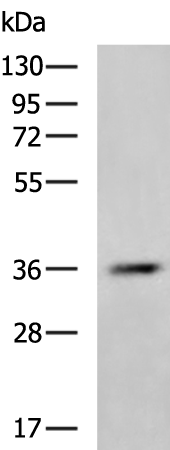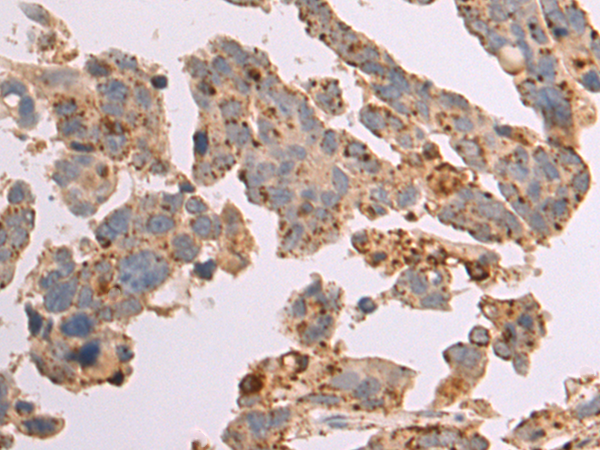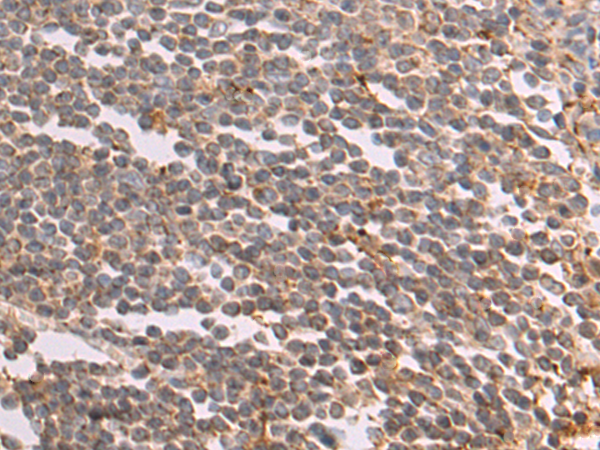


| WB | 咨询技术 | Human,Mouse,Rat |
| IF | 咨询技术 | Human,Mouse,Rat |
| IHC | 1/100-1/300 | Human,Mouse,Rat |
| ICC | 技术咨询 | Human,Mouse,Rat |
| FCM | 咨询技术 | Human,Mouse,Rat |
| Elisa | 1/5000-1/10000 | Human,Mouse,Rat |
| Aliases | CTSX |
| WB Predicted band size | 34 kDa |
| Host/Isotype | Rabbit IgG |
| Antibody Type | Primary antibody |
| Storage | Store at 4°C short term. Aliquot and store at -20°C long term. Avoid freeze/thaw cycles. |
| Species Reactivity | Human, Mouse, Rat |
| Immunogen | Fusion protein of human CTSZ |
| Formulation | Purified antibody in PBS with 0.05% sodium azide and 50% glycerol. |
+ +
以下是3篇与CTSZ(Cathepsin Z)抗体相关的研究文献概览:
---
1. **文献名称**:*Cathepsin Z as a novel potential biomarker for osteoporosis*
**作者**:Li Y, et al. (2020)
**摘要**:该研究通过免疫组化(IHC)和Western blot分析,发现骨质疏松患者骨组织中CTSZ表达显著升高。使用特异性CTSZ抗体验证其与破骨细胞活化的相关性,提示CTSZ可能成为骨代谢疾病的潜在生物标志物。
---
2. **文献名称**:*Role of Cathepsin Z in Tumor-Associated Macrophage Polarization*
**作者**:Wang X, et al. (2018)
**摘要**:研究利用CTSZ敲除小鼠模型及抗CTSZ抗体进行流式细胞术分析,揭示CTSZ通过调控NF-κB通路促进肿瘤微环境中巨噬细胞向M2型极化,从而加速肿瘤进展。
---
3. **文献名称**:*Proteomic Profiling of Cathepsin Z in Neurodegenerative Disorders*
**作者**:Smith JL, et al. (2016)
**摘要**:通过免疫荧光和ELISA技术,结合抗CTSZ抗体检测阿尔茨海默病患者脑脊液样本,发现CTSZ蛋白水平异常升高,提示其可能参与神经炎症及β-淀粉样蛋白沉积过程。
---
如需具体文献链接或补充信息,可进一步提供研究方向(如疾病模型、实验技术等)。
Cathepsin Z (CTSZ), a member of the cysteine cathepsin protease family, is a lysosomal enzyme involved in protein degradation, extracellular matrix remodeling, and antigen processing. Unlike other cathepsins, CTSZ uniquely combines a protease domain with a conserved integrin-binding RGD motif, enabling interactions with cell surface receptors and extracellular signaling. It is expressed in immune cells (e.g., macrophages, dendritic cells) and tissues like the liver, kidney, and placenta. CTSZ plays roles in inflammation, angiogenesis, and tumor progression, with dysregulation linked to cancers, autoimmune diseases, and neurodegenerative disorders.
CTSZ antibodies are essential tools for studying its expression, localization, and function. They enable detection via Western blotting, immunohistochemistry, and flow cytometry, aiding research into CTSZ's role in disease mechanisms. For example, elevated CTSZ levels correlate with tumor invasiveness and poor prognosis in certain cancers, while reduced activity is implicated in rheumatoid arthritis. Antibodies targeting the RGD motif also explore its integrin-mediated signaling pathways. Additionally, structural studies using CTSZ antibodies contribute to drug development, particularly for inhibitors designed to modulate its proteolytic activity in pathological conditions. These antibodies thus serve as critical reagents in both basic research and therapeutic exploration.
×